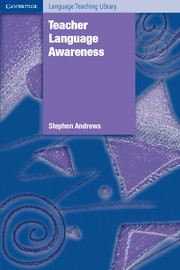Book contents
- Frontmatter
- Contents
- Acknowledgements
- Introduction
- Prologue: The challenge of being ‘language-aware’
- 1 Language Awareness, ‘Knowledge About Language’ and TLA
- 2 TLA and the teaching of language
- 3 TLA and the ‘grammar debate’
- 4 TLA and teachers' subject-matter cognitions
- 5 TLA and pedagogical practice
- 6 The TLA of expert and novice teachers
- 7 TLA and the native-speaker and non-native-speaker debate
- 8 TLA and student learning
- 9 TLA and teacher learning
- Epilogue: TLA and teacher professionalism
- Appendix
- References
- Index
- Publisher's acknowledgements
6 - The TLA of expert and novice teachers
Published online by Cambridge University Press: 30 July 2009
- Frontmatter
- Contents
- Acknowledgements
- Introduction
- Prologue: The challenge of being ‘language-aware’
- 1 Language Awareness, ‘Knowledge About Language’ and TLA
- 2 TLA and the teaching of language
- 3 TLA and the ‘grammar debate’
- 4 TLA and teachers' subject-matter cognitions
- 5 TLA and pedagogical practice
- 6 The TLA of expert and novice teachers
- 7 TLA and the native-speaker and non-native-speaker debate
- 8 TLA and student learning
- 9 TLA and teacher learning
- Epilogue: TLA and teacher professionalism
- Appendix
- References
- Index
- Publisher's acknowledgements
Summary
Introduction
The present chapter examines the TLA of L2 teachers with differing amounts of teaching experience and differing degrees of teaching expertise. It begins with a brief introduction to ideas within the teacher education literature concerning the stages of teacher development and the nature of expertise. This is followed by observations about the TLA of novice and advanced beginner L2 teachers, drawing in the main on quantitative data. The main part of the chapter is then devoted to discussion of research (based mainly on qualitative data) shedding light on the characteristics of the TLA of highly proficient/expert L2 teachers, focusing first on a study of the TLA of three highly proficient L2 teachers, and then on the TLA of one particular teacher, Marina, the ‘expert’ teacher from Tsui (2003).
The stages of teacher development
The distinction between ‘novice’ and ‘expert’ teachers has been extensively explored in the education literature (Carter et al., 1988; Leinhardt, 1989; Livingston and Borko, 1989; Westerman, 1991; and Berliner, 1994 are just some examples of such studies). Few (if any) of those early studies focused upon the special characteristics of the L2 teacher. More recently, however, as part of the increased attention to L2 teacher cognitions noted in Chapter 4, Tsui's (2003) case studies of four secondary school teachers of L2 English have revealed a great deal about the nature of expertise in language teaching and how such expertise may develop during the teacher's professional life cycle.
- Type
- Chapter
- Information
- Teacher Language Awareness , pp. 118 - 142Publisher: Cambridge University PressPrint publication year: 2007



